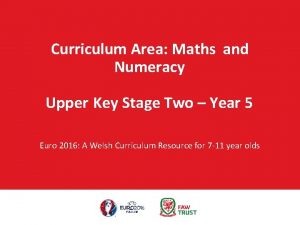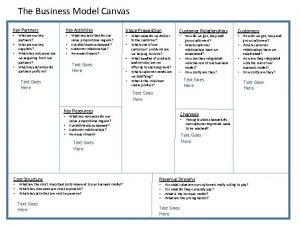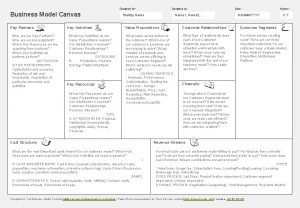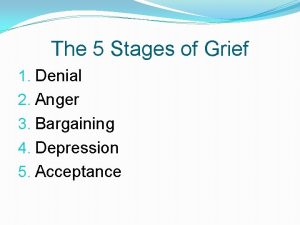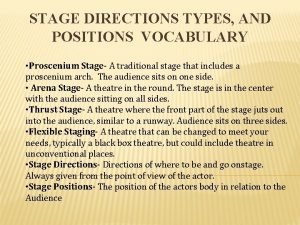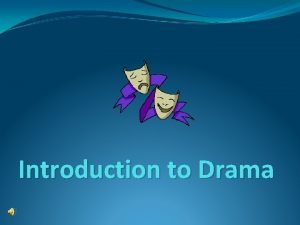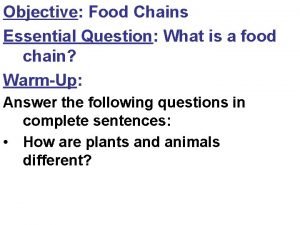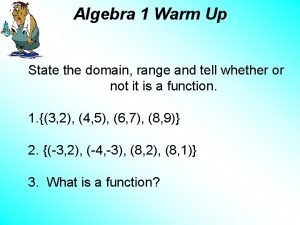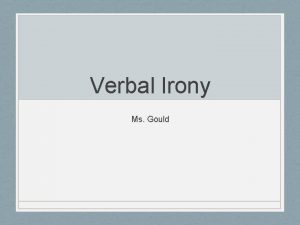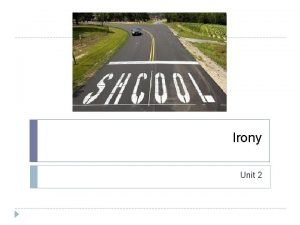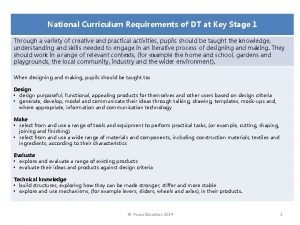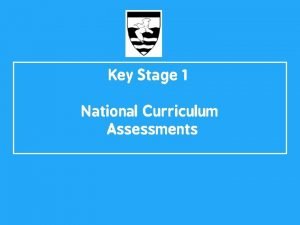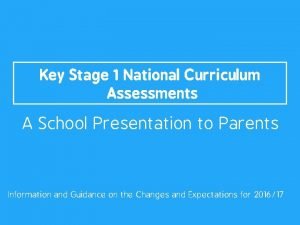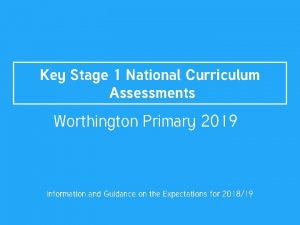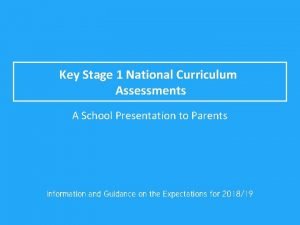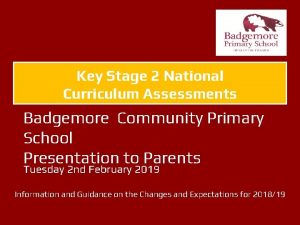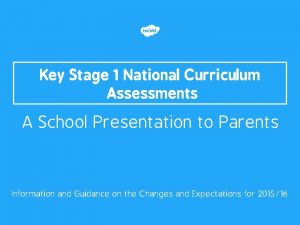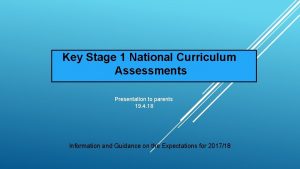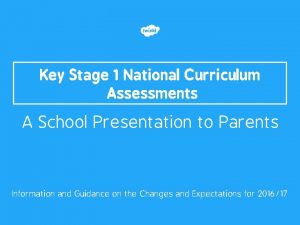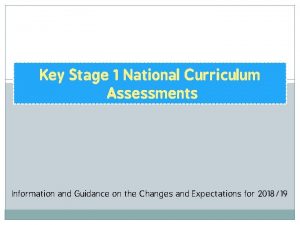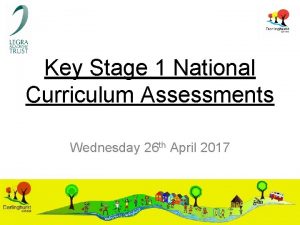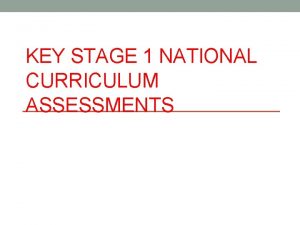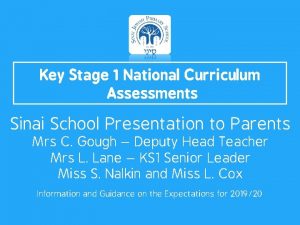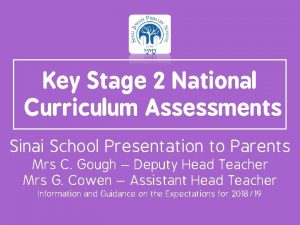Key Stage 1 National Curriculum Assessments A warm
















- Slides: 16

Key Stage 1 National Curriculum Assessments

A warm welcome! Aims • Explain school arrangements for KS 1 SATs • An opportunity to look at sample test materials • Question and Answers

Key Stage 1 National Curriculum Assessment Changes A new National Curriculum was introduced in 2014. As a result, the Standards and Testing Agency (STA) is changing the tests so that they assess the new curriculum. Pupils will take the new tests for the first time in May 2016. There is a Df. E video outlining the 2016 changes in KS 1 and KS 2: https: //www. youtube. com/watch? v=t 7 dg. Wl. Inpok

Df. E position statement As part of the National Curriculum review, levels have been abolished. This is in part in response to concerns about the validity and reliability of levels and sub-levels. These concerns had an impact on pupils’ learning, but also on the relationships between primary and secondary schools and the trust in their assessments. Levels have also been recognised as the driver of undue pace through the curriculum, which has led to gaps in pupils’ knowledge

Tests and Teacher Assessment • The administered tests will have a score which we use to determine whether they are working at the expected standard at end of KS 1 alongside evidence of work in books • If this score is not reflective of your child’s ability then books be used as evidence. Teacher assessment will be reported to Kent • We will report whether your child is v. Not accessing the year 2 curriculum (PKS) vworking towards the expected standard (WTS) vworking at the expected standard(EXP) vworking at greater depth within the expected standard (GDS) in reading, writing and Maths vworking at the expected standard or not in Science v. In our annual report which is sent home in July.

The Tests • At the end of Year 2, children will take assessments in: • Reading; • English grammar, punctuation and spelling; these are optional. • Maths. • SATs have to be carried out during May but there are no set dates nationally – At Downs View this will be the weeks commencing 15 th and 22 nd May.

Reading • The Reading Test consists of two separate papers: • Paper 1 – Contains a selection of texts totalling between 400 and 700 words with questions about the text. • Paper 2 – Contains a reading booklet of a selection of passages totalling 800 to 1100 words. Children will write their answers to questions about the passage in a separate booklet. • Each paper is worth 50% of the marks and should take approximately 30 minutes to complete, although the children are not being assessed at working at speed so will not be strictly timed. • The texts will cover a range of poetry, fiction and non-fiction. • Questions are designed to assess the comprehension and understanding of a child’s reading. • Some questions are multiple choice or selected response, others require short answers and some require an extended response or explanation.

Spelling, Punctuation and Grammar • The test consists of two separate papers: • Paper 1: spelling (20 marks). • Paper 2: questions (20 marks).

Sample Questions Grammar, Punctuation and Vocabulary Paper chapter menu next page

Sample Questions Grammar, Punctuation and Spelling Paper chapter menu next page

Mathematics • Children will sit two tests: Paper 1 and Paper 2: • Paper 1 is for arithmetic, lasting approximately 25 minutes and worth 25 marks. It covers calculation methods for all operations. • Paper 2 covers problem solving, reasoning and mathematical fluency, lasts for approximately 35 minutes and is worth 35 marks. • Pupils will still require calculation skills and questions will be varied including multiple choice, matching, true/false, completing a chart or table or drawing a shape. Some questions will also require children to show or explain their working out.

Sample Questions Maths Paper 1: Arithmetic chapter menu next page

Sample Questions Maths Paper 2: Reasoning chapter menu next page

How the tests are administered: • Children are told it is a ‘challenge’ and are not told it is a test. • In classroom in smaller groups. • Words/ numbers/learning walls have to be covered up • Teacher assessment is what is reported • Tests are a validation of teacher assessment • Children absent will still sit the tests if back before end of term

click to see all text How to Help Your Child • First and foremost, please supportdoand notreassure mentionyour the word child that TEST! there (Weiswon’t nothing be!)to worry about and that they should always just try their best. Praise and encourage! • If your child appears worried or different at home during these 2 weeks, support and • reassure Ensure yourchildhas that thethere bestispossible nothingattendance to worry about at school. and that they should always just try their best. Praise and encourage! • Support your child with any homework tasks. • Ensure your child has the best possible attendance at school. • Reading, spelling and arithmetic (e. g. times tables) are always good to practise. • Support your child with any homework tasks. • Talk to your child about what they have learnt at school and what book(s) they are reading • Reading, (the character, spelling the and plot, arithmetic their opinion). (e. g. times tables) are always good to practise. • Talk Maketosure your child about haswhat a good theysleep haveand learnt healthy at school breakfast and what everybook(s) morning! they are reading (the character, the plot, their opinion). • Make sure your child has a good sleep and healthy breakfast every morning! • Liaise with school if you have any issues/concerns at any point chapter menu next page

Any Questions?
 Upper key stage 2 maths
Upper key stage 2 maths Example of business model
Example of business model Business model canvas tripadvisor
Business model canvas tripadvisor Stage 1 denial
Stage 1 denial Downstage theatre definition
Downstage theatre definition Positions on stage
Positions on stage 2 stage tender process
2 stage tender process Stage right stage left
Stage right stage left Stage left vs stage right
Stage left vs stage right What do bats eat
What do bats eat Motion graphs warm up answer key
Motion graphs warm up answer key Warm up domain range and functions answer key
Warm up domain range and functions answer key Warm up to irony answer key
Warm up to irony answer key Tom has always liked lucy
Tom has always liked lucy Chinese national curriculum core subjects
Chinese national curriculum core subjects Non statutory subjects national curriculum
Non statutory subjects national curriculum Dt national curriculum
Dt national curriculum
